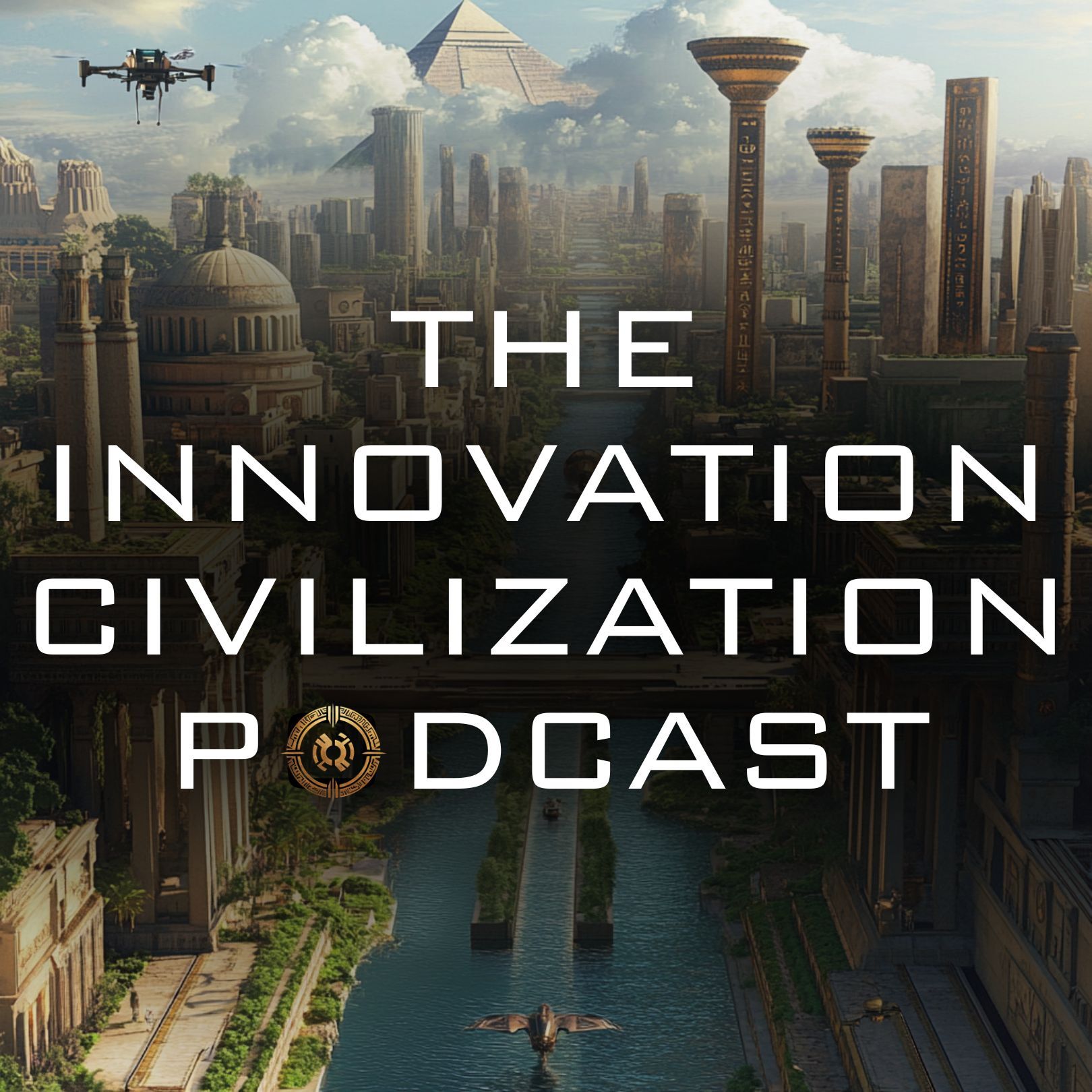Episodes
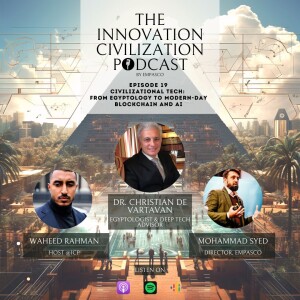
Saturday Nov 11, 2023
Saturday Nov 11, 2023
From the technology used to build pyramids by Ancient Egyptians to blockchain & AI today, there's tremendous continuity in how technologies developed. We're joined by Dr. Christian de Vartavan, a distinguished Egyptologist whose contributions include 10 seminal works in Egyptology and an impressive tally of 40 scientific discoveries. Beyond his expertise in Egyptology, Christian is also recognized as a technologist and an accomplished authority in blockchain and artificial intelligence who regularly advises the UK government on the strategic integration of these emerging technologies.
We have also been joined by our Empasco director, Mohammad Syed. (@MohammadSyed159)
Join us for a thought-provoking conversation that spans across epochs, connecting the wisdom of ancient civilizations with the forefront of modern technological innovation.
In this episode, we delve into:
-Christian's journey from the realms of Egyptology to the forefront of blockchain and AI
-The parallels and intersections between ancient civilizations and cutting-edge technology
-Insights into his ground-breaking scientific discoveries and their implications for the modern world
-The role of blockchain and AI in shaping the future of media, society, and beyond
-A reflection on his family's legacy of advisory roles in royal, presidential, and governmental spheres, influencing trade, business, economics, and science.
Follow our host Waheed Rahman (@iwaheedo), for more updates on tech, civilizational growth, progress studies, and emerging markets.
Here are the timestamps for the episode. On some podcast players, you should be able to click the timestamp for the episode.
(00:00) - Intro
(03:15) - Christian's background in Egyptology
(04:50) - About Christian's technological advisory role for the UK government
(06:41) - Technologies in Ancient Egypt
(10:20) - Views on the Pyramid making process
(13:01) - Controversial perspectives related to the Pyramids
(19:06) - Have we forgotten how to build a Pyramid?
(21:32) - Are we facing a modern-day puzzle with artificial intelligence, much like the ancient mysteries that confounded civilizations?
(30:24) - Do AI and blockchain technologies pose a risk of widening societal disparities? Is there a global divergence in AI approaches among countries?
(35:27) - How are we planning to enforce standards in regulating AI?
(37:53) - Amidst growing distrust in giants like Google and Facebook and a rise in anti-globalism, how does society navigate diminishing faith in both private and global institutions?
(42:06) - Considering the unmet expectations, boom-and-bust cycles, and recent downturn, what is the current assessment of the state and future direction of crypto and blockchain technology?
(51:05) - What are the scopes of these technological development related to Christian's proprietary tech at Projectus that focuses on the classification of knowledge and the philosophy of the internet?
(54:29) - How does Christian envision the future of statecraft, shaped by the concept of network states on the internet?
(60:07) - Outro
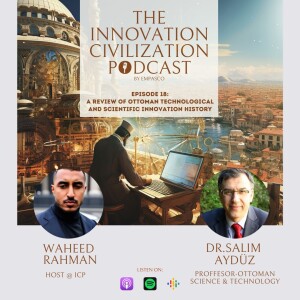
Saturday Oct 21, 2023
Saturday Oct 21, 2023
In this episode, we sat down with Professor Dr. Salim Ayduz, a distinguished expert in Ottoman science and technology delving into the rich tapestry of technical innovations that helped create the Ottoman Empire's 600+ year tri-continental legacy.
In the episode, we cover:
-the forgotten pioneers of Ottoman science & technology
-the social, political, and economic dynamics that influenced Ottoman innovation
-comparative analysis of Ottoman and Western scientific and technological progress
-challenges the empire faced in keeping pace with the changing world
Tune in to this enlightening episode that reveals the hidden chapters of Ottoman innovation, while also shedding new light on the challenges the empire faced as it navigated the currents of change across the centuries.
Follow our host Waheed Rahman (@iwaheedo), for more updates on tech, civilizational growth, progress studies, and emerging markets.
Here are the timestamps for the episode. On some podcast players, you should be able to click the timestamp for the episode.
(00:00) - Intro
(02:15) - Professor Salim's background
(04:10) - Origin of the Ottoman Empire and why there is a lack of information on the Ottoman innovation landscape?
(11:44) - What is the Professor's research methodology when it comes to consuming knowledge and researching Ottoman innovation and inventions?
(15:35) - Ottoman's contribution to astronomy and astrology
(26:35) - Ottoman's contribution to mathematics
(31:45) - The inception and mass adoption of gunpowder and cannons in the Ottoman era
(36:11) - Notable innovations and inventions during the Ottoman period
(43:59) - The socio-political dynamics that influenced the decline of Ottoman contribution to science and technology
(50:49) - Challenges the empire faced in keeping pace with the changing world
(57:20) - Classical books reading recommendation by Professor on Ottoman innovation
(59:00) - Outro
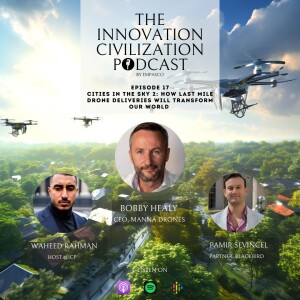
Saturday Sep 02, 2023
Saturday Sep 02, 2023
On this episode, we're joined by serial entrepreneur and CEO of Manna Bobby Healy (@realBobbyHealy) who runs one of the Top 5 drone delivery companies in the world. We also welcomed back a friend of the pod Pamir Sevincel, Partner at Blackbird.
Join us as we talk about the ins and outs of a fundamental technology that'll terraform the way we live: last-mile drone delivery.
In this episode, we cover:
-Bobby's entrepreneurial journey and the lessons learned along the way
-The genesis of Manna and the vision for drone-powered deliveries
-The environmental impact of replacing traditional delivery vehicles with drones
- Business models and venture funding landscape: current, future and past.
- Advice to founders building hardware-heavy companies
-The challenges and opportunities in the emerging drone delivery industry
-The future of on-demand delivery and its potential to reshape urban living
Follow our host Waheed Rahman (@iwaheedo), for more updates on tech, civilizational growth, progress studies, and emerging markets.
Here are the timestamps for the episode. On some podcast players, you should be able to click the timestamp for the episode.
(00:00) - Intro
(02:25) - Bobby's journey to leading several successful startups
(03:16) - What is Manna Aero?
(07:50) - Use case of drone delivery for E-commerce businesses
(15:04) - Replacing traditional delivery vehicles with drones?
(20:00) - How feasible is drone delivery in rural/suburban areas?
(22:21) - Economic impact on suburban drone delivery
(26:01) - Challenges in the delivery drone industry
(33:12) - What factors make places like Texas particularly appealing for startups and investors in the consumer business sector? What should be the focus of startups in the drone delivery space: profitability or scalability?
(40:02) - Can AI-generated models help optimize drone delivery services?
(52:56) - Future of on-demand delivery and the impending challenges
(65:12) - Competitive Advantage and Unique Value Proposition of Manna
(67:48) - Quick Fire Round
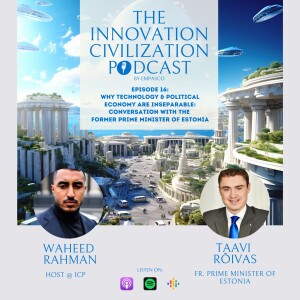
Saturday Jul 08, 2023
Saturday Jul 08, 2023
We're joined at Empasco by the former Prime Minister of Estonia Taavi Roivas, who ran and built both sets of organizations: leading the highest political office of one of the most technologically advanced EU governments and now also being a technology entrepreneur to a hard tech startup doing mobilities.
In the episode, we cover:
- the confluence of technology and politics in shaping the future
- can you run governments like tech startups? Similarities and differences.
- education & what young people should study
- the challenges that tech brings to democracies
- AI, crypto, de-dollarisation and hot takes on the recent mega-trends with how governments should respond.
Follow our host Waheed Rahman (@iwaheedo), for more updates on tech, civilizational growth, progress studies, and emerging markets.
Here are the timestamps for the episode. On some podcast players, you should be able to click the timestamp for the episode.
(00:00) - Intro
(02:37) - Taavi's academic and political backstory
(08:34) - How did Taavi successfully balance youth political engagement and academic pursuits, particularly in technology and science, while maintaining a harmonious environment towards a shared vision?
(11:16) - What are the key similarities and differences in running a political organization compared to a technology or private organization?
(14:14) - How is Auve Tech transforming the public transport sector?
(19:46) - How can we encourage more individuals interested in societal development to engage in politics with a genuine understanding of technology?
(25:30) - Should the use of disruptive contemporary tech like AI be heavily regulated?
(30:58) - How can governments achieve self-disruption, akin to companies like Amazon, while simultaneously maintaining stability for society? How to navigate the trade-off between
embracing change and ensuring stability
(38:54) - Thoughts on the notion of the United States being in decline and the emergence of a more multipolar world? How would such shifts impact smaller countries and the
field of technology?
(41:14) - What should the government's approach be for the use of cryptocurrencies?
(44:18) - What is the government's stance on the potentially destabilizing effects of technology, particularly social media and digitization, on democracy, considering concerns about the
influence of platforms like Facebook and Twitter in shaping election outcomes?
(50:16) - Quick Fire Round
(53:40) - Outro
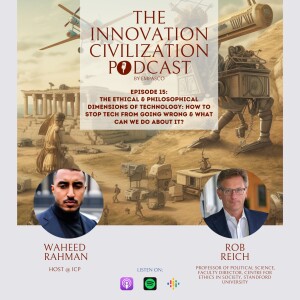
Friday Jun 02, 2023
Friday Jun 02, 2023
In this episode, we're joined by one of the founding faculties of Stanford's technology ethics course. Professor Rob Reich is the author of the recently published book "System Error: Where Big Tech Went Wrong & How We Can Reboot."
In the face of society-altering AI and advancing technologies, we confront pressing ethical and societal challenges. How do we address them effectively without letting technology wreak havoc?
In the episode, we discuss:
-how technology is reshaping our society
-the problem with the efficiency and optimization-only mindset
-the ethical and social impact of the digital technologies
-the problems with big tech
-is democracy fit for purpose in the age of tech
Join us as we analyze the critical challenges faced by the digital society and present thought-frameworks for a feasible system reboot.
Follow our host Waheed Rahman (@iwaheedo), for more updates on tech, civilizational growth, progress studies, and emerging markets.
Here are the timestamps for the episode. On some podcast players, you should be able to click the timestamp for the episode.
(00:00)- Intro
(03:31)- Origin story of the book -"System Error: Where Big Tech Went Wrong & How We Can Reboot."
(05:17)- Does the specialization of knowledge witnessed in the past 2 centuries contribute more to our advancement or impede it?
(09:56)- Is optimization bad for us?
(13:23)- Is "stakeholder capitalism" the only way forward
(14:26)- Is our current form of democracy optimized sufficiently to guide us towards the right conclusions amidst the rapid acceleration of technological advancements?
(19:08)- Is sacrificing short-term prosperity for long-term stability and collective success worthwhile for societies pursuing lasting progress?
(20:26)- How can we ensure that our institutions are adept at crafting agile regulations that can effectively address the evolving landscape of technology?
(27:01)- How to strike a balance between implementing essential guardrails and the potential risk of losing innovation and economic benefits to jurisdictions with more permissive regulations?
(30:32)- What are the limitations and potential drawbacks of relying solely on experts and dismissing the input and perspectives of the general public on important issues?
(32:50)- How can we navigate towards a more balanced approach that incorporates stakeholder capitalism?
(38:02)- How to assess the ongoing exploration and search for effective governance and cap table structures that successfully balance social impact and economic incentives?
(39:00)- What is the problem with Big Tech?
(41:25)- Outro
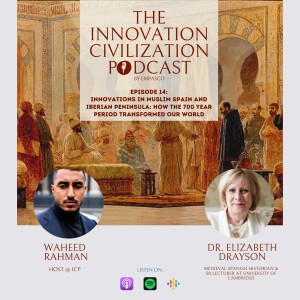
Saturday Apr 15, 2023
Saturday Apr 15, 2023
Centuries before the official Renaissance of Europe began as we deem it, there was a part of Europe (i.e. Muslim Spain) which already begun the 'Renaissance' and made the region a powerhouse of innovation and prosperity that would go on to shape the world we live in today. A tale of technical innovations, pluralistic cohabiting of various religions, and translation of ideas that formed our modern universities/libraries today.
We uncover a part of history that is often overlooked; our host Waheed Rahman (@iwaheedo), delves into the 700-year Muslim rule in Spain - or Al-Andalus as it was called. He is joined by Dr. Elizabeth Drayson, Emeritus Fellow and Senior Lecturer at the University of Cambridge and author of four books on medieval Spanish history who takes us on a journey through the incredible scientific, cultural, economic, and diplomatic innovations that emerged during this time.
In the episode we cover,
-the rise of Muslim rule in Spain
-the development of science (astronomy, mathematics, agriculture, & medicine, etc.) in Muslim Spain that laid the foundations for all modern innovation and inventions
- Jewish-Muslim-Christian cohabitation and relations in Muslim Spain.
- The 'Golden Age for the Jews' and the tale of Jewish Viziers (Prime ministers) of Islamic emirates
- The Arabic-to-Latin translation movement
- Lessons from 'Convivencia' for the contemporary world
Join us as we uncover the hidden gems of history and showcase the incredible innovations that have shaped our world today.
Follow our host Waheed Rahman (@iwaheedo), for more updates on tech, civilizational growth, progress studies, and emerging markets.
Here are the timestamps for the episode. On some podcast players, you should be able to click the timestamp for the episode.
(00:00) - Intro
(03:15) - The emergence of Islamic Spain or Al-Andalus
(06:07) - The historical significance of the region
(07:49) - Exchange of Knowledge: Golden age of Jews under Muslims
(16:28) - The contribution of Islamic Spain to modern technologies in the fields of scientific development, innovation, politics, & Governance
(25:27) - Knowledge transfer: Importance of the Translation Movement
(34:01) - What were some of the shortcomings or failures of Islamic rule in Spain, and how did they impact its legacy and relevance in modern times?
(38:31) - How can we apply the lessons of historical collaboration and coexistence between different peoples and faiths to address contemporary conflicts and tensions in the world?
(40:58) - Outro
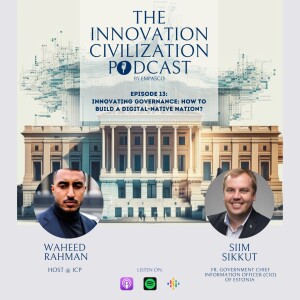
Sunday Feb 26, 2023
Sunday Feb 26, 2023
How to build a digital-native nation? How to use digital-native design to solve voter fraud and corruption?
For an action-packed episode with an actual builder of digital governments, our host Waheed Rahman (@iwaheedo) takes the seat with one of the world’s most influential people in the field of digital governance, Siim Sikkut. (@sikkut) The man who led Estonia’s groundbreaking E-residency program and also played a builder role as the Estonian government’s former Chief Information Officer (CIO). Siim is also the author of the book ‘Digital Government Excellence: Lessons from Effective Digital Leaders” and helps policymakers and technologists around the globe in building future-ready digital societies.
On the episode we cover:
-the fundamentals of building a digital nation
-E-residency, virtual identity programs for non-residents
-Estonian government's technological and legal approach to transforming the country into one of the most advanced digital nations in the world
-strategies and policies needed to launch and steer development initiatives and regulations
-how to use digital design solutions in overcoming issues such as voter fraud, tax fraud, corruption and enabling agile policymaking in government
-how to collaborate with relevant stakeholders on policies concerning technology and digital adoption
-how to use the best practices of scalable startups in innovating solutions for citizens
Follow our host Waheed Rahman (@iwaheedo) for more updates on tech, civilizational growth, progress studies, and emerging markets.
Here are the timestamps for the episode. On some podcast players, you should be able to click the timestamp for the episode.
(00:00) - Intro
(04:05) - Siim's background in digital government
(06:44) - What is the reason for the Tiger Leap Initiative originating in Estonia?
(08:14) - What is unique about the Estonian government's digital Program?
(13:49) - How was the issue of building citizens' trust addressed in Estonia governments' digital program initiatives?
(15:45) - What approaches were taken to address the problem of voter fraud?
(25:25) - What steps were taken to communicate to government stakeholders and ministers that the process was iterative and there was a risk of failure, and how were they convinced of the importance of taking such risks in pursuing e-government progress?
(28:00) - Revenue model of the E-Residency program of Estonia
(33:13) - In what ways were digital solutions leveraged to combat corruption and enhance transparency?
(36:32) - What are the best practices for smaller countries in Asia, Africa, and Latin America that are interested in adopting a more digital government approach similar to the Estonian model?
(43:25) - what approach do you think is more effective for politicians in terms of giving remits and prescriptions to civil servants for technology initiatives?
(45:48) - What lessons can be learned from the failures of digital governments, and what traps do government officials commonly encounter on their digital journeys?
(48:21) - Quick Fire Round
(50:10) - Outro
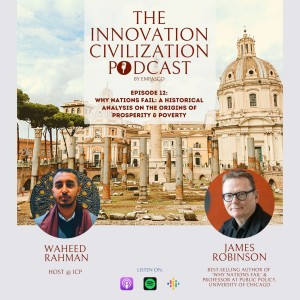
Saturday Oct 29, 2022
Saturday Oct 29, 2022
2024 Nobel Prize Winner & Co-author of the best-selling book “Why Nations Fail”, James A. Robinson joined us to discuss the role of political and economic institutions in shaping the success or failure of nations. A political scientist and economist, Robinson is currently a professor at the University of Chicago and one of the world’s leading experts on political and economic development. His research delves into the root causes of poverty, conflict, and economic inequality across the globe.
In the episode, we cover:
-the basics of institution building
-the key differences between inclusive & extractive economic/political institutions and their impact on economies
-what spurred development in some parts of the world and why others lagged behind
-historical context behind what led to the rise and fall of nations
-how to develop sustainable political and economic systems for successful nation building
Follow our host Waheed Rahman (@iwaheedo),, for more updates on tech, civilizational growth, progress studies, and emerging markets.
Here are the timestamps for the episode. On some podcast players, you should be able to click the timestamp for the episode.
(00:00) - Introduction
(05:54) - James's background and what motivated him to study about institutions, economics & nations?
(11:09) - Significance of democracy for nation building
(13:22) - Definition and importance of political/economic institutions
(14:07) - Characteristics of inclusive and extractive institutions
(16:51) - How can political centralization drive economic growth?
(19:41) - Are inclusive institutions more democratic?
(21:02) - Does democracy ensure economic development?
(23:12) - Was the Industrial Revolution the biggest source of inequality in the world?
(28:08) - Examples of nations with extractive forms of institutions
(30:47) - Impact of European Colonialism on poor countries
(35:57) - What sort of political/economic system drove China's economic growth?
(40:36) - Is China's growth sustainable given the current authoritarian regime/institution policies?
(42:56) - How do geography and culture impact economic development?
(48:17) - What do virtuous and vicious circles mean in light of developing political/economic institutions?
(58:05) - Outro
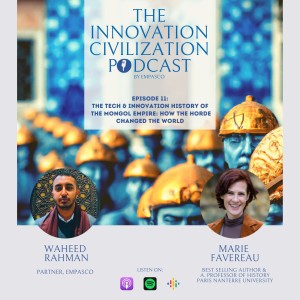
Saturday Jul 23, 2022
Saturday Jul 23, 2022
Founded by the infamous Genghis Khan in 1206, the Mongol Empire created the 2nd largest kingdom in the history of the planet.
What's less well known is that Mongol rule ushered in a plethora of technological innovation and development that shaped the formative years in trade & science infrastructure of a land mass spanning all the way to the East from Korea, through China, Central Asia, Russia, Persia and to even Eastern Europe parts like Crimea and modern day Ukraine.
In an attempt to excavate and summarise the lasting impact the Mongol innovation, technology and governance had on the world, Empasco Partner Waheed Rahman (@iwaheedo) sits with historian and Financial Times best-selling author, Marie Favereau. Marie is an Associate Professor of History at Paris Nanterre University. She has been a member of the French Institute of Oriental Archaeology in Cairo, a visiting scholar at the Institute for Advanced Study, and a research associate at the University of Oxford for the major project Nomadic Empires. Her books
include The Horde: How the Mongols Changed the World (https://www.amazon.com/Horde-How-Mongols-Changed-World/dp/0674244214) and the Mamluk Sultanate (published in French) and the graphic novel Genghis Khan.
In the episode we cover:
-the reason for the rise of the Mongol Empire in the 13th & 14th CE.
-long-term innovation view that the Mongols took in terms of funding projects
-the strategies they took to set up the agricultural production and taxation systems throughout the kingdom
-how they built and sustained the system for continuous innovation processes in areas such as astronomy, agriculture, maths, medicine, trade, botany, etc.
-Early forms of democracy in the Mongol empires
Follow our host Waheed Rahman (@iwaheedo) for more updates on tech, civilizational growth, progress studies, and emerging markets.
Here are the timestamps for the episode. On some podcast players, you should be able to click the timestamp for the episode.
(00:00) - Intro
(06:10) - Marie's background & inspiration for writing a book on Mongol innovation and tech history
(08:05) - Who were the Mongols?
(11:08) - What is the "Horde"?
(13:33) - Were the Mongols just people who ravaged and conquered land through coercion and fear-mongering?
(20:10) - What Military technology did the Mongols use?
(27:38) - Mongol innovation,tech,governanace history
(39:36) - Mongol economics
(42:39) - Mongol system of wealth distribution
(43:28) - How did the Mongols manage the Silk Road?
(45:52) - About the creation of the largest integrated market in Pre-modern history
(47:43) - How did the Mongols set up the infrastructure and economy of the cities within the empire?
(52:40) - What was the Mongols' foreign policy to attract new trade and develop connections?
(59:23) - The Mongol land law
(61:25) - How did taxation help with the agricultural production?
(62:30) - What led to the downfall of the Mongol Empire?
(65:26) - Mongol Governance
We made this episode a special listening experience btw.
Mongolian throat singing & classical instruments used:
Yoochin- hammered dulcimer of varying strings struck using two bamboo hammers
Khuuchir- two- or four-stringed instrument with a small sound box
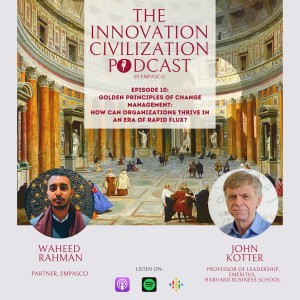
Saturday May 21, 2022
Saturday May 21, 2022
The defining periods in world history have always come about as a result of successful change management and revolutionary leadership. Reflecting on the last 2 decades of rapid flux coupled with
the ongoing global unrest in trade, politics, and commerce arising from a looming global recession, the Ukraine-Russia War and the after-effects of COVID19 calls for a timely occasion on
navigating through the factors leading to successful change management and leadership.
For an educative and thrilling episode on understanding the golden principles of change management and how public and private organizations can thrive in an era of rapid flux, we bring you
the most revered and one of Time Magazine's top 25 most influential authors ever on business and management - Professor John P. Kotter.(@JohnPKotter) He is the best-selling author, The Konosuke
Matshishita Professor of Leadership, Emeritus at the Harvard Business School, award-winning business and management thought leader and founder of one of the leading management consulting
firms, Kotter International - a leadership management organization for the Global 5000 company leaders. He is the author of 22 books, 12 of them bestsellers - on business, management,
leadership, strategy execution, and transformation and his work has been published in over 150+ foreign languages.
In the episode, we cover:
-how Professor Kotter's 8-step change framework and 8 accelators can be applied in today's management processes
-how private and public organizations can implement and manage change
-the key distinctions between management and leadership
-functions of organizational lifecycles and dual operating system
-how big corporations can incorporate the startup mentality
-whether leadership training is necessary
Follow our host Waheed Rahman (@iwaheedo) for more updates on tech, civilizational growth, progress studies, and emerging markets.
Here are the timestamps for the episode. On some podcast players, you should be able to click the timestamp for the episode.
(00:00) - Intro
(06:26) - Professor John P. Kotter's background
(10:25) - How should modern firm's react to the level of rapid change?
(12:44) - Is the 8-step change model still relevant today?
(15:34) - Is the 8 accelerators similar to the 8-step change framework? What are the accelators needed for?
(16:44) - How to implement and manage change amidst the ever changing nature of work?
(19:47) - Management vs leadership
(29:59) - How are hierarchies and networks connected to the organizational life cycle?
(35:52) - Use case example of dual operating system
(39:19) - How to incorporate a startup mentality in large organizations?
(43:51) - How does change management differ for public vs private organizations?
(46:43) - Rapid-fire round: Getting to know more about the guest
(49:47) - About Professor Kotter's most recent book - "Change"
(52:43) - Can we train people to become better leaders?
(54:20) - Outro

